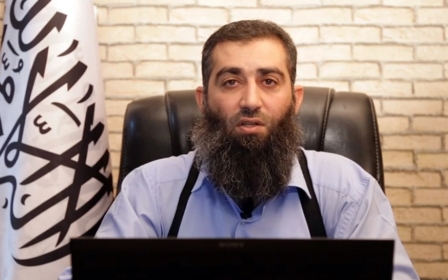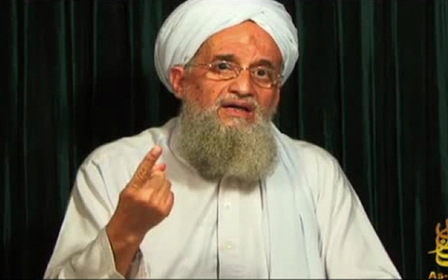Ahrar al-Sham spiritual adviser confirms account of Rifai Taha's last days

A spiritual adviser to Syrian rebel group Ahrar al-Sham has confirmed MEE’s exclusive report published earlier this week that an Egyptian Islamist killed by a US drone strike last month in Syria was on a mission bidding to temper al-Qaeda affiliate Nusra Front’s activities in the country.
On Thursday, Abu al-Abbas al-Shami, who has served as a formative influence on Ahrar al-Sham while remaining independent, tweeted that Rifai Taha, a co-founder of Egypt’s Gama’a al-Islamiyaa, was in Syria trying to rein in Nusra before he was killed on 5 April.
“The sheikh intended to say that much of what al-Qaeda is doing today goes against the intentions of Sheikh Osama,” al-Shami wrote on Twitter, presumably referring to al-Qaeda founder Osama bin Laden.
“I confirm the veracity of everything in this report,” he also tweeted, linking to an Arabic translation of MEE's story. He added, however, that one of the men killed with Taha – Abu Omar al-Masri - had been misidentified as a member of Ahrar al-Sham.
As soon as he heard about the drone strike and given his knowledge of Taha’s mission, Shami said that he believed the killing came “in the context of an attempt to push away any moderate group that could have an effect on al-Nusra and throw their weight behind a moderate path”.
On Monday, MEE reported that he was in Syria attempting to persuade Nusra Front fighters face-to-face that their infighting with other rebel groups and focus on emirate-building was damaging the war-torn country.
Taha was also in Syria to stop infighting that had erupted between Nusra, which shares al-Qaeda's vision of a global struggle, and Ahrar al-Sham, which believes in fighting only the Syrian government and the Islamic State (IS) group, over theological differences and territory gained in Idlib in late March, according to two well-informed sources in contact with Taha ahead of his early April trip.
The account differed from the narrative in media reports soon after the attack and US Central Command’s public comments which said the strike had killed “core al-Qaeda operatives” who threatened US national security.
The details of his mission raise questions about who ordered the killing and whether US policymakers are fully aware of a group of Islamists some say could potentially rally rebels to work together towards bringing the Syrian civil war to an end and steer them away from an agenda focused on attacking the West.
One of the sources who was in close contact with Taha before his trip said the Egyptian had aimed to persuade fighters from Nusra to join Ahrar or to at least scale back their al-Qaeda representation in Syria.
Taha was a credible person to carry out such a mission, both sources said, because of his influence within al-Qaeda after many years earning the respect of bin Laden and other key al-Qaeda leaders in Afghanistan.
On the evening of 5 April, Taha and four others were driving away from a meeting in Idlib city with Nusra, including leader Mohammed al-Golani, said one of the sources. They stopped to get petrol and were hit by the drone strike before they could get out of their car, the source said.
"I am not even sure the US knew who exactly was in the car," said one of the sources.
Killed with Taha were three bodyguards and Abu Omar al-Masri. One of the sources in touch with Taha ahead of his visit said al-Masri was an Egyptian commander of Ahrar al-Sham; however in his tweets on Thursday al-Shami, the Ahrar spiritual guide, said he was not a member of the group.
Given Taha’s access to the Atmeh border – the location where he crossed into Syria, which requires permission from the Turkish military or intelligence - and the precise nature of the drone strike, one of the sources familiar with his trip said he believed the Gamaa al-Islamiyya leader was “sent to Syria to die – either by the Turks or his own people”.
Sam Heller, a Beirut-based analyst who tweets as Abu Jamajem, said on Friday that beyond Shami's confirmation Taha had come to bolster relative moderates within Nusra and steer the group in a more conciliatory direction, it was "very difficult to say with confidence exactly what is being discussed within Nusra and between which internal camps".
Sources who were in touch with Taha ahead of his trip say he was there to pull Nusra back from its global ambitions and emirate-building intiatives. Heller said he thought neither were being seriously considered at this point by the group anyway.
"Rather," said Heller, "I would assume he was there to discourage Nusra from threatening and attacking smaller rebel rivals and to tell it to slow down its attempts at unilateral social and political control in Syria's opposition-held areas, which have aggravated Syria's other rebels."
New MEE newsletter: Jerusalem Dispatch
Sign up to get the latest insights and analysis on Israel-Palestine, alongside Turkey Unpacked and other MEE newsletters
Middle East Eye delivers independent and unrivalled coverage and analysis of the Middle East, North Africa and beyond. To learn more about republishing this content and the associated fees, please fill out this form. More about MEE can be found here.




